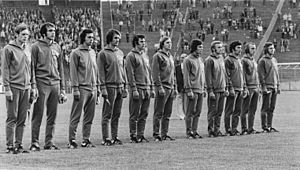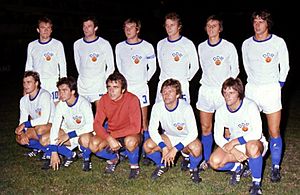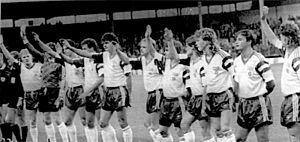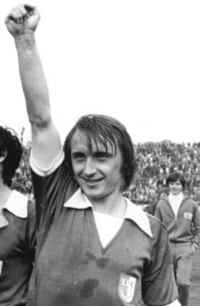East Germany national football team facts for kids
| to 1952–1990 | ||||||||||||||||||||
|---|---|---|---|---|---|---|---|---|---|---|---|---|---|---|---|---|---|---|---|---|
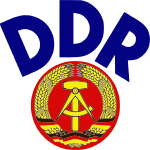 |
||||||||||||||||||||
| Nickname(s) | "Weltmeister der Freundschaftsspiele" (World champion in friendly games) | |||||||||||||||||||
| Association | Deutscher Fußball-Verband der DDR | |||||||||||||||||||
| Confederation | UEFA (Europe) | |||||||||||||||||||
| Most caps | Joachim Streich (98) | |||||||||||||||||||
| Top scorer | Joachim Streich (53) | |||||||||||||||||||
| Home stadium | Zentralstadion, Leipzig | |||||||||||||||||||
| FIFA code | GDR | |||||||||||||||||||
|
||||||||||||||||||||
| First international | ||||||||||||||||||||
(Warsaw, Poland; 21 September 1952) |
||||||||||||||||||||
| Biggest win | ||||||||||||||||||||
| Unofficial (Colombo, Ceylon; 8 January 1964) Official (Colombo, Ceylon; 12 January 1964) |
||||||||||||||||||||
| Biggest defeat | ||||||||||||||||||||
| Unofficial (Hungary; 18 May 1952) Official (Warsaw, Poland; 21 September 1952) (Cardiff, Wales; 25 September 1957) (Leipzig, East Germany; 27 October 1957) (Accra, Ghana; 23 February 1964) (Naples, Italy; 22 November 1969) (Antwerp, Belgium; 18 April 1973) (Glasgow, Scotland; 30 October 1974) (Rotterdam, Netherlands; 15 November 1978) (Budapest, Hungary; 28 March 1979) (Goiânia, Brazil; 8 April 1986) (Montevideo, Uruguay; 29 January 1985) (Copenhagen, Denmark; 8 May 1985) (Kiev, Soviet Union; 26 April 1989) (Vienna, Austria; 15 November 1989) (Kuwait City, Kuwait; 24 January 1990) |
||||||||||||||||||||
| World Cup | ||||||||||||||||||||
| Appearances | 1 (first in 1974) | |||||||||||||||||||
| Best result | Second group stage (1974) | |||||||||||||||||||
|
Medal record
|
||||||||||||||||||||
The East Germany national football team was a soccer team that played for East Germany. It was known as Germany DR by FIFA, the world's football governing body. This team was one of three German teams that played after World War II. The others were Saarland and West Germany.
East Germany played in the World Cup only once, in 1974. After Germany became one country again in 1990, the East German football association joined the West German one. This meant the East German team stopped playing.
Contents
Team History and Key Moments
In 1949, before East Germany was officially formed, people were already trying to play football. The East German football association (DFV) joined FIFA in 1952.
First Games and Early Years
The team's first international game was on September 21, 1952, against Poland in Warsaw. East Germany lost 3–0. Their first home game was in Dresden against Bulgaria on June 14, 1953. It was a 0–0 draw.
East Germany did not enter the 1954 World Cup. West Germany won that tournament, which made many Germans very happy. To compete, East Germany started picking players based on their skill, not just their political views. In 1957, 120,000 fans watched East Germany beat Wales 2–1 in Leipzig.
Playing in the 1974 World Cup
East Germany's only time playing in a major tournament was the 1974 World Cup. This tournament was held in West Germany. Both German teams were in the same group.
They both did well against Chile and Australia, so they already knew they would move to the next round. But the game between East and West Germany on June 22, 1974, in Hamburg was very important. East Germany won 1–0 with a goal from Jürgen Sparwasser. This was a huge moment for East Germany.
After that famous win, East Germany lost to Brazil and the Netherlands. They finished third in their group. West Germany, however, went on to win the entire World Cup.
End of the Team
East Germany almost made it to the 1990 World Cup. They needed a tie against Austria in their last game in November 1989. But Austria won 3–0, and East Germany did not qualify.
On October 3, 1990, East and West Germany became one country again. This also meant their football teams joined together. The East German team's planned games were canceled. Their very last game was a friendly match against Belgium on September 12, 1990, in Brussels. East Germany won 2–0. A planned game between East and West Germany to celebrate the unification was canceled.
Players Joining the Unified German Team
Before Germany became one, players who had played for East Germany could not play for West Germany. But after 1990, FIFA changed the rules. Players from the East German team could then play for the new, unified German team.
Eight players played for both East Germany and the unified German team. Famous players like Matthias Sammer and Ulf Kirsten were among them.
Olympic Football Success
| Medal record | ||
|---|---|---|
| Olympic Games | ||
| Bronze | 1964 Tokyo | Team |
| Bronze | 1972 Munich | Team |
| Gold | 1976 Montreal | Team |
| Silver | 1980 Moscow | Team |
East Germany had much more success in Olympic football. This was because they could use their best players from their top league. West Germany, however, used amateur players for the Olympics.
- In 1964, East German players helped the "United Team of Germany" win a Bronze medal.
- As East Germany, they won another Bronze in 1972 in Munich.
- They won the Gold medal in 1976 in Montreal.
- They earned a Silver medal in 1980 in Moscow.
East vs. West Germany Matches
East and West Germany played each other only a few times. Their most famous match was the 1974 World Cup game, which East Germany won 1–0.
They also played three times in Olympic football. In 1964, East Germany beat West Germany to qualify for the Olympics. In the 1972 Olympic Games, East Germany won against West Germany 3–2.
A game was planned for November 1990 to celebrate the unification of Germany's football teams. However, it was canceled.
Player Records and Achievements
Most Appearances for East Germany
The player with the most games for East Germany was Joachim Streich. He played 98 times for the team.
| # | Player | Caps | Goals | Years played |
|---|---|---|---|---|
| 1 | Joachim Streich | 98 | 53 | 1969–1984 |
| 2 | Hans-Jürgen Dörner | 96 | 8 | 1969–1985 |
| 3 | Jürgen Croy | 86 | 0 | 1967–1981 |
| 4 | Konrad Weise | 78 | 1 | 1970–1981 |
| 5 | Eberhard Vogel | 69 | 24 | 1962–1976 |
Top Goalscorers for East Germany
Joachim Streich was also the top goalscorer for East Germany, with 53 goals.
| # | Player | Goals | Caps | Ratio | Years played |
|---|---|---|---|---|---|
| 1 | Joachim Streich | 53 | 98 | 0.54 | 1969–1984 |
| 2 | Eberhard Vogel | 24 | 69 | 0.35 | 1962–1976 |
| 3 | Hans-Jürgen Kreische | 22 | 46 | 0.48 | 1968–1975 |
| 4 | Rainer Ernst | 20 | 56 | 0.36 | 1981–1990 |
| 5 | Henning Frenzel | 19 | 54 | 0.35 | 1961–1974 |
Players for Both East and Unified Germany
After 1990, some players who had played for East Germany also played for the unified German team.
| Player | East Germany | Unified Germany | Overall | |||
|---|---|---|---|---|---|---|
| Caps | Goals | Caps | Goals | Caps | Goals | |
| Ulf Kirsten | 49 | 14 | 51 | 20 | 100 | 34 |
| Matthias Sammer | 23 | 6 | 51 | 8 | 74 | 14 |
| Andreas Thom | 51 | 16 | 10 | 2 | 61 | 18 |
| Thomas Doll | 29 | 7 | 18 | 1 | 47 | 8 |
Coaches of the Team
The East German national football team had several coaches during its history:
- 1952–1953
 Willi Oelgardt
Willi Oelgardt - 1954
 Hans Siegert
Hans Siegert - 1955–1957
 János Gyarmati
János Gyarmati - 1958–1959
 Fritz Gödicke
Fritz Gödicke - 1959–1961
 Heinz Krügel
Heinz Krügel - 1961–1967
 Károly Sós
Károly Sós - 1967–1969
 Harald Seeger
Harald Seeger - 1970–1981
 Georg Buschner
Georg Buschner - 1982–1983
 Rudolf Krause
Rudolf Krause - 1983–1988
 Bernd Stange
Bernd Stange - 1988–1989
 Manfred Zapf
Manfred Zapf - 1989–1990
 Eduard Geyer
Eduard Geyer
Team Honours
The East Germany national football team won several medals in the Olympic Games:
See also
 In Spanish: Selección de fútbol de Alemania Democrática para niños
In Spanish: Selección de fútbol de Alemania Democrática para niños
 | James Van Der Zee |
 | Alma Thomas |
 | Ellis Wilson |
 | Margaret Taylor-Burroughs |


